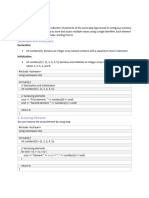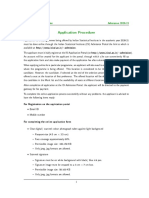0% found this document useful (0 votes)
18 views7 pagesDSA Cheatsheet
The document provides an overview of Data Structures and Algorithms (DSA) in C++, covering key concepts such as data structures (arrays, linked lists, stacks, queues, trees), algorithms (sorting and searching), and complexity analysis. It includes definitions, operations, and example code snippets for each data structure and algorithm. Additional topics like graphs, dynamic programming, and hashing are mentioned as potential areas for further exploration.
Uploaded by
arsalaan272158Copyright
© © All Rights Reserved
We take content rights seriously. If you suspect this is your content, claim it here.
Available Formats
Download as PDF, TXT or read online on Scribd
0% found this document useful (0 votes)
18 views7 pagesDSA Cheatsheet
The document provides an overview of Data Structures and Algorithms (DSA) in C++, covering key concepts such as data structures (arrays, linked lists, stacks, queues, trees), algorithms (sorting and searching), and complexity analysis. It includes definitions, operations, and example code snippets for each data structure and algorithm. Additional topics like graphs, dynamic programming, and hashing are mentioned as potential areas for further exploration.
Uploaded by
arsalaan272158Copyright
© © All Rights Reserved
We take content rights seriously. If you suspect this is your content, claim it here.
Available Formats
Download as PDF, TXT or read online on Scribd
/ 7























































































